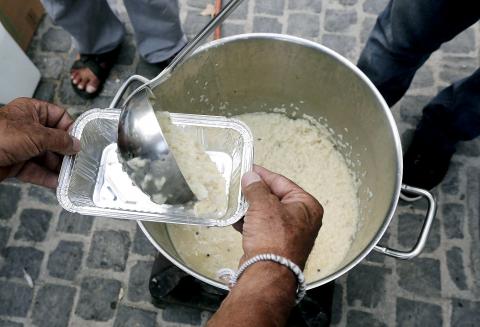Greece is close to a deal with its international creditors over thousands of job cuts aimed at clearing the way for the debt-laden nation to receive the next tranche of bailout funds worth 8.1 billion euros (US$10.4 billion), officials said.
“Very important progress was made,” a Greek Ministry of Finance official said late on Saturday after several hours of talks with representatives from the “troika” of lenders: the EU, the European Central Bank and the IMF, the state-run Athens News Agency reported.
Another official from the Greek Ministry of Administrative Reform told reporters: “We are in agreement, no new meeting is required” on a thorny dispute involving thousands of civil service layoffs.

Photo: Reuters
Greece needs to come to an agreement on the next package of reforms with the troika before today, when the Eurogroup meets to decide if the bloc should release the next instalment of rescue funds worth 6.3 billion euros.
The IMF is also scheduled to decide by the end of this month whether to disburse its scheduled contribution of 1.8 billion euros to the bailout kitty.
The funds are necessary as Greece must redeem three-month and six-month debt worth 6.6 billion euros by the middle of next month.
Among the reforms being negotiated are 4,000 state jobs, which would have to go by the end of the year. Greece must also redeploy 25,000 civil servants across its vast bureaucracy. These include hundreds of teachers, whom Athens has proposed to move to other state services.
Another 3,500 municipal police are to be incorporated in the national forces, a proposed move that has sparked strong opposition from local administration staff.
The latest cuts will be enshrined in a new multi-purpose law that will be tabled in Greece’s parliament today.
Since 2010, the EU and IMF have committed a total of 240 billion euros to the heavily indebted country.
In exchange for the funds, Greece has agreed to a series of reforms, including a commitment to raise revenues by offloading state assets.
However, Athens has been forced to once again scale back the expected revenues from its privatization drive for this year to 1.6 billion euros from the 2.6 billion euros forecast earlier.
The missing billion is to be rolled over to next year, a Greek official told the Athens News Agency.
Athens last month failed to sell DEPA, Greece’s public gas distributor, after Russian giant Gazprom JSC pulled out of the bidding process.
Greece has pledged to raise 9.5 billion euros in asset sales by 2016, slightly less than one-fifth of the original target of 50 billion euros.

Intel Corp chief executive officer Lip-Bu Tan (陳立武) is expected to meet with Taiwanese suppliers next month in conjunction with the opening of the Computex Taipei trade show, supply chain sources said on Monday. The visit, the first for Tan to Taiwan since assuming his new post last month, would be aimed at enhancing Intel’s ties with suppliers in Taiwan as he attempts to help turn around the struggling US chipmaker, the sources said. Tan is to hold a banquet to celebrate Intel’s 40-year presence in Taiwan before Computex opens on May 20 and invite dozens of Taiwanese suppliers to exchange views

Application-specific integrated circuit designer Faraday Technology Corp (智原) yesterday said that although revenue this quarter would decline 30 percent from last quarter, it retained its full-year forecast of revenue growth of 100 percent. The company attributed the quarterly drop to a slowdown in customers’ production of chips using Faraday’s advanced packaging technology. The company is still confident about its revenue growth this year, given its strong “design-win” — or the projects it won to help customers design their chips, Faraday president Steve Wang (王國雍) told an online earnings conference. “The design-win this year is better than we expected. We believe we will win

Chizuko Kimura has become the first female sushi chef in the world to win a Michelin star, fulfilling a promise she made to her dying husband to continue his legacy. The 54-year-old Japanese chef regained the Michelin star her late husband, Shunei Kimura, won three years ago for their Sushi Shunei restaurant in Paris. For Shunei Kimura, the star was a dream come true. However, the joy was short-lived. He died from cancer just three months later in June 2022. He was 65. The following year, the restaurant in the heart of Montmartre lost its star rating. Chizuko Kimura insisted that the new star is still down

While China’s leaders use their economic and political might to fight US President Donald Trump’s trade war “to the end,” its army of social media soldiers are embarking on a more humorous campaign online. Trump’s tariff blitz has seen Washington and Beijing impose eye-watering duties on imports from the other, fanning a standoff between the economic superpowers that has sparked global recession fears and sent markets into a tailspin. Trump says his policy is a response to years of being “ripped off” by other countries and aims to bring manufacturing to the US, forcing companies to employ US workers. However, China’s online warriors